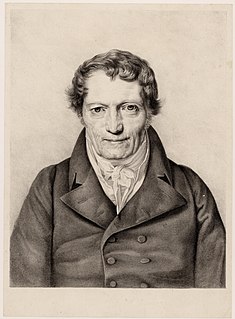Giuseppe Maria Gioacchino Cambini was an Italian composer and violinist.

Breitkopf & Härtel is the world's oldest music publishing house. The firm was founded in 1719 in Leipzig by Bernhard Christoph Breitkopf.
The Allgemeine Zeitung was the leading political daily journal in Germany in the first part of the 19th century. It has been widely recognised as the first world-class German journal and a symbol of the German press abroad.

The Oxford Companion to Music defines music criticism as "the intellectual activity of formulating judgments on the value and degree of excellence of individual works of music, or whole groups or genres". In this sense, it is a branch of musical aesthetics. With the concurrent expansion of interest in music and information media over the past century, the term has come to acquire the conventional meaning of journalistic reporting on musical performances.
This is a chronological list of works by E. T. A. Hoffmann.
"The Three Bs" is a term derived from an expression coined by Peter Cornelius in 1854, which added Hector Berlioz as the third B to occupy the heights already occupied by Johann Sebastian Bach and Ludwig van Beethoven. Later in the century, conductor Hans von Bülow substituted Johannes Brahms for Berlioz. The phrase is generally used in discussions of classical music to refer to the supposed primacy of Bach, Beethoven, and Brahms in the field.

Singet dem Herrn ein neues Lied, BWV 225, is a motet by Johann Sebastian Bach. It was first performed in Leipzig around (probably) 1727. The text of the three-movement motet is in German: after Psalm 149 for its first movement, the third stanza of "Nun lob, mein Seel, den Herren" for the second movement, and after Psalm 150:2 and 6 for its third movement Psalms 150:2,6.

August Ferdinand Hermann Kretzschmar was a German musicologist and writer, and is considered a founder of hermeneutics in musical interpretation and study.
Moritz Adolf Schlesinger, generally known during his French career as Maurice Schlesinger, was a German music editor. He is perhaps best remembered for inspiring the character of M. Arnoux in Gustave Flaubert's novel Sentimental Education.
Wolfgang Amadeus Mozart died after a short illness on 5 December 1791, aged 35. His reputation as a composer, already strong during his lifetime, rose rapidly in the years after his death, and he became one of the most celebrated of all composers.
Georg August von Griesinger was a tutor and diplomat resident in Vienna during the late 18th and 19th centuries. He is remembered for his friendships with the composers Joseph Haydn and Ludwig van Beethoven, and for the biography he wrote of Haydn.

Johann Friedrich Rochlitz was a German playwright, musicologist and art and music critic. His most notable work is his autobiographical account Tage der Gefahr about the Battle of Leipzig in 1813 — in Kunst und Altertum, Goethe called it "one of the most wondrous productions ever to have been written". A Friedrich-Rochlitz-Preis for art criticism is named after him — it is awarded by the Leipzig Gesellschaft für Kunst und Kritik and was presented for the fourth time in 2009.

Gottfried Christoph Härtel was a music publisher in Leipzig, companion to Bernhard Christoph Breitkopf. He took over their company, Breitkopf & Härtel, in 1796 from Breitkopf, who was having financial difficulties.

Johann Baptist Krall was an Austrian composer, conductor, music editor/arranger, and member of the board of directors of the Wiener Singverein of the Gesellschaft der Musikfreunde.

Friedrich Wilhelm Arnold was a German musician, music seller, publisher and folk-song collector.

Anna Therese Friederike von Zandt zu Reichartshausen was a German pianist and singer. She was the mother of the composers Friedrich Burgmüller and Norbert Burgmüller.

Wilibald Nagel (also Willibald Nagel, was a German musicologist and music critic.
Christian Johann Christoph Schreiber was a German theologian, philologist, philosopher, and poet. He was also the Superintendent of the dioceses of Lengsfeld and Dermbach. He was connected in friendship or correspondence to writers and philosophers of his time, and published poetry, sermons, historical and philosophical works.

Christian Friedrich Gottlob Wilke was a German organist, composer, music teacher, music writer and organ revisor.










